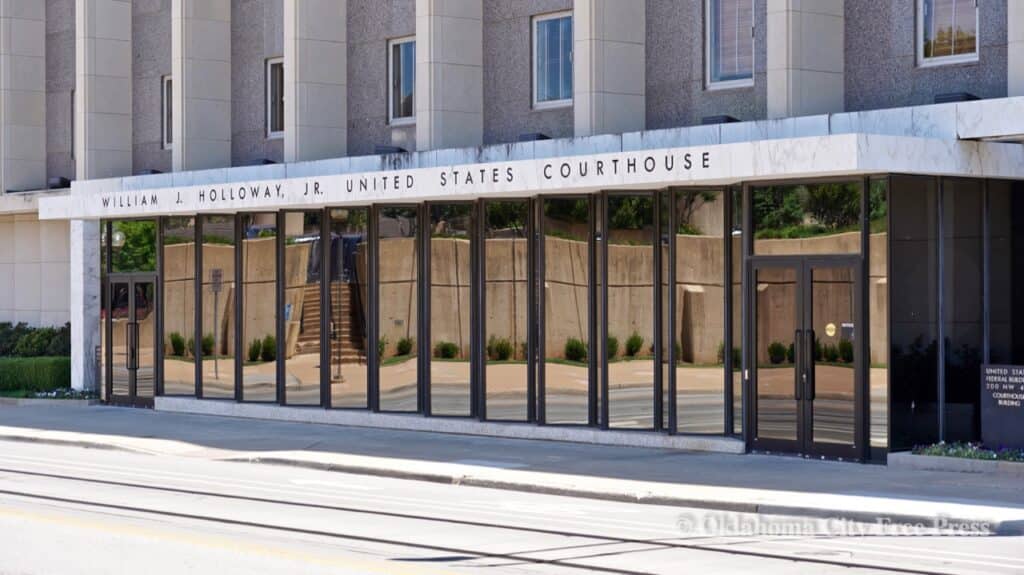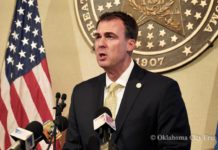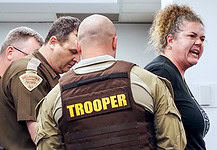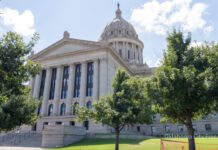Last Updated on December 5, 2023, 8:34 PM | Published: December 5, 2023
OKLAHOMA CITY — After two years of waiting, House Bill 1775 finally had its day in court.
The 2021 law, one of Oklahoma’s most controversial, bans eight race and gender concepts from public school classrooms and prohibits mandatory diversity training at universities.
Oklahoma City federal Judge Charles Goodwin heard oral arguments Monday on a lawsuit seeking to overturn the law. A group of students, teachers, activists and college professors filed the lawsuit with attorneys from the American Civil Liberties Union, the Lawyers’ Committee for Civil Rights and Schulte Roth & Zabel.
Goodwin peppered attorneys with questions and hypothetical situations of how teachers are meant to have classroom discussions on racial history and implicit bias without violating the law. The judge is expected to issue a ruling on the case in the coming weeks.

ACLU of Oklahoma legal director Megan Lambert said Goodwin’s questions are “very encouraging.”
“His hypotheticals go to so much of what our teacher clients have alleged — that they do not know what the appropriate response is when a student makes a certain point,” Lambert said to reporters after the hearing. “I don’t believe that we heard a clear answer from the state today.”
HB 1775 prohibits the teaching that a person is inherently racist, that a person is responsible for actions by others of their same race or sex, and that students should feel guilt or discomfort over past actions committed by people of their same race or sex, among other provisions.
The state’s solicitor general, Garry Gaskins, told the judge teachers can’t endorse any of the banned topics, but they can address race and gender issues as long as the discussion relates to the Oklahoma Academic Standards, which is a lengthy list of topics that public schools must teach.
Those standards include the evolution of race relations in Oklahoma, including Jim Crow laws, the rise of the Ku Klux Klan and the ongoing impact of the Tulsa Race Massacre.
The plaintiffs’ attorneys contend the law’s wording is vague and confusing, making it impossible for teachers to both cover the academic standards and ensure they don’t run afoul of HB 1775.
The result is a chilling effect for educators, particularly on issues relating to Black and Indigenous people, ACLU attorney Emerson Sykes said during the hearing.
“They avoid these topics altogether or they risk losing their jobs,” Sykes said.
The consequences for violating the law are significant — teachers could have their license suspended or revoked and school districts risk their accreditation status.
Tulsa Public Schools had its accreditation downgraded because a teacher training course included statements on implicit bias.
The Oklahoma State Department of Education decided the school district didn’t teach one of the eight banned concepts, but the training “more likely than not” included remarks that were inspired by the prohibited topics.
This is an attack on Black minds, on Black children.
Millwood High School teacher Anthony Crawford
Goodwin questioned whether this interpretation went beyond the law’s explicit meaning. Attorneys from both sides appeared to agree that it did.
Gaskins said the Tulsa district might have a reasonable claim in court to challenge its punishment over HB 1775, but the school district isn’t a party in the lawsuit, rendering the argument irrelevant.
A spokesperson for the Attorney General’s Office, Phil Bacharach, said after the hearing the district’s penalty “was not consistent with our understanding of HB 1775.” Regardless, the Attorney General’s Office believes the law, as written, is constitutional, he said.
The fact that two state agencies disagree over the law’s meaning “is exactly what we mean when we say it is vague,” Lambert said. A key danger of a vague law, ACLU attorneys said, is overbroad enforcement.
The federal judge also asked whether he should rule on HB 1775 rather than the Oklahoma Supreme Court. He appeared to weigh the options of certifying the case to the state Supreme Court or narrowing or striking it down himself.
Millwood High School teacher Anthony Crawford is one of the plaintiffs hoping the law is overturned entirely. He said HB 1775 limits the ability of Black students and teachers to openly discuss their history.
“When this law was first passed, me and my colleagues, we were afraid,” Crawford said after the hearing. “This is an attack. This is an attack on Black minds, on Black children.”
Republished in partnership with Oklahoma Voice under Creative Commons license CC BY-NC-ND 4.0. Oklahoma Voice is a part of States Newsroom which is a nonprofit news network supported by grants and a coalition of donors as a 501c(3) public charity. Oklahoma Voice maintains editorial independence. Contact Editor Janelle Stecklein for questions: [email protected]. Follow Oklahoma Voice on Facebook and Twitter.
Nuria Martinez-Keel covers education for Oklahoma Voice and can be found at @NuriaMKeel on X (Twitter). She worked in newspapers for six years, more than four of which she spent at The Oklahoman covering education and courts. Nuria is an Oklahoma State University graduate.











